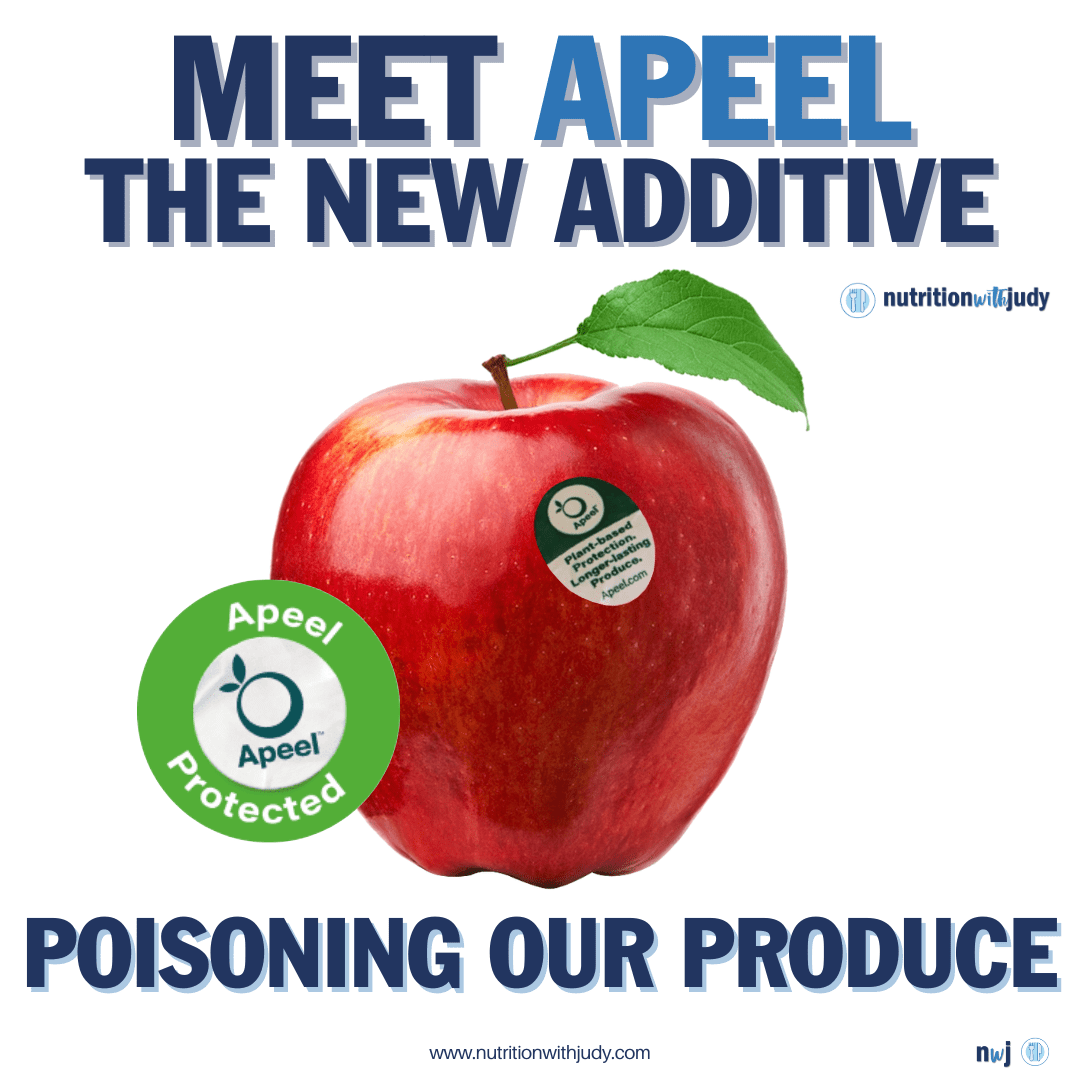

Meet Apeel, the New Additive Poisoning Our Produce


Apeel is a new plant-based protection that was developed in order to help keep produce stay fresh for longer. It achieves this by coating the outside of all fruits and vegetables with proprietary chemicals that slow down water loss and oxidation. Apeel is marketed as a thin, plant-based, edible peel that coats fresh produce, acting similarly to the plant’s cuticle layer. The postharvest coating may sound like a wonderful invention at first glance with the mission to help minimize food and plastic waste in plant food production, but once you look into the ingredients, discover the fact that it can’t be washed off, and also has many other concerns, you may want to reconsider. Let’s take a closer look at the new Apeel technology that’s already been approved for use in several countries including the United States.
What Is Apeel?
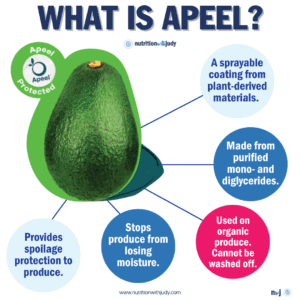

Apeel is a sprayable coating from plant-derived materials that has been approved for fresh fruits and vegetables in the United States, Canada, Chile, China, Colombia, Japan, Kenya, Mexico, Peru, and South Africa without any restrictions. Apeel Sciences is the parent company name but has multiple product names registered for edible food coatings. The Apeel product line currently offers two product types. The first is called Invisipeel which can be applied directly to crops in a field by farmers. The second product type requires farmers to wait until the crops are ready before harvesting and applying. This second category has two approved products: Edipeel for non-organic produce and Organipeel for organic produce.
It has also been approved for use for only certain types of fruit in various European countries. The main purpose of this product is to create a thin protective peel in order for fresh produce to maintain its moisture and protect itself from spoilage. Apeel is designed to keep produce fresh for at least twice the amount of time.
For more background information on Apeel, watch this short introduction video here.
Who Is Funding Apeel?
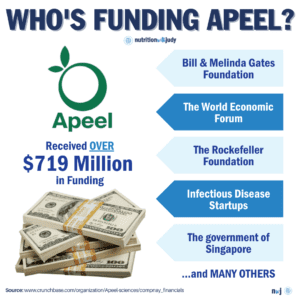

Apeel has received a total of $719.1 million in funding from 33 investors. Some of the most notable investors in Apeel’s Edipeel technology include:
- Bill and Melinda Gates Foundation
- The World Economic Forum
- The Rockefeller Foundation
- Infectious Disease Startups
- The government of Singapore
So, why are some of the world’s arguably notoriously corrupt organizations funding this? What do they have to gain with the unrestricted use of adding Apeel to all fresh vegetables and fruits in several countries? Before we put our conspiracy hats on, let’s discuss what this plant-derived food additive really is.
What Are the Ingredients in Apeel?
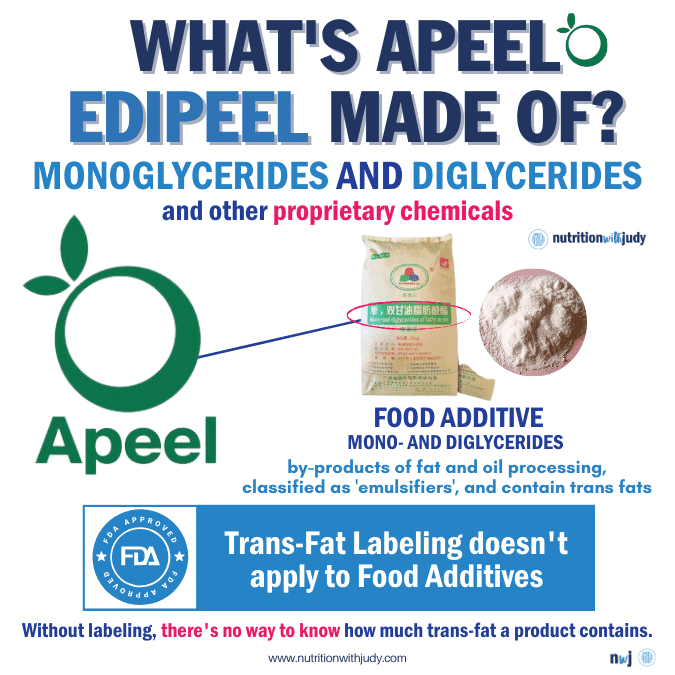

Per its website, Apeel Edipeel is composed entirely of purified monoglycerides and diglycerides. While the company is marketing these ingredients as plant-based molecules that naturally occur in peels, seeds, and plant pulp, these ingredients can be quite problematic for a few reasons.
How Are Monoglycerides and Diglycerides Made?
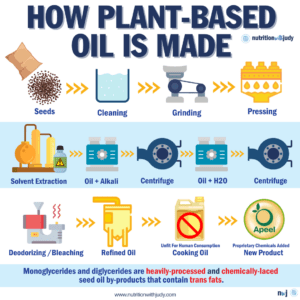

Monoglycerides and diglycerides are naturally present in certain seed oils such as grapeseed oil and cottonseed oil. However, concentrations are low and difficult to isolate. That’s why these compounds must be manufactured through a chemical reaction that starts with a triglyceride-containing animal fat or vegetable oil. The most commonly used vegetable oils are hydrogenated soybean or palm oils. Since Apeel’s formula is plant-derived, its mono- and diglycerides are manufactured from vegetable oil. High heat and an alkaline catalyst (glycerol) are utilized for the chemical reaction, rearranging the triglycerides into mono- and diglycerides. This results in a mixture of all three mono-, di-, and triglycerides. The next step is saponification and distillation in order to further isolate the mono- and diglycerides, removing the triglycerides, water content, and other impurities.
The end result of pure mono- and diglycerides are food additives generally used as emulsifiers, ingredients that help blend water and oil together. They can be found in most processed foods and serve the purpose of improving the user’s eating experience (e.g., reducing the stickiness in candy, giving ice cream a creamier consistency, and preventing peanut butter’s oil from separating). A 2017 study reported that 70% of emulsifiers in US food products are in fact mono- and diglycerides. These emulsifiers are also frequently used to extend the shelf life of processed foods.
The Dangers of Monoglycerides and Diglycerides
Monoglycerides and diglycerides are heavily processed, chemically-laced seed oil byproducts that contain trans fats. Trans fats are known to promote inflammation throughout the body and have been linked to cardiovascular disease, diabetes, and obesity. Studies also show that trans fats can have an adverse impact on the brain and nervous system, diminish mental health performance, distort cell membranes, lead to infertility in women, and compromise fetal development. In 2006, the FDA began requiring manufacturers to list trans fat on food labels. However, this law applies to lipids and not emulsifiers such as mono- and diglycerides. In 2018, the FDA banned the addition of trans fat to foods, but since mono- and diglycerides are classified as emulsifiers, the ban doesn’t apply to these additives. They can actually be used in any food without any limitations.
So, how can the FDA state that mono- and diglycerides are generally safe even though they contain trans fats? The reasoning provided by the FDA is that the small amounts of trans fats found in these emulsifiers aren’t harmful. However, many people aren’t just consuming a small amount. One study found that the presence of small amounts of trans fats in hydrogenated or partially hydrogenated oils/food products likely causes many Americans to exceed their recommended maximum. With no trans fat labeling requirements needed for emulsifiers such as mono- and diglycerides, there’s no way of knowing how much trans fat is in products that contain them.
Another issue with consuming mono- and diglycerides is that they convert back to triglycerides in the bloodstream. High triglycerides are linked to the hardening of arteries, the increased risk of cardiovascular disease, and pancreatitis. Monoglycerides have also been deemed by the European Food Safety Authority (EFSA) as “toxic elements” that may have substantial consequences from consumption. Another EFSA review warned that monoglycerides may contain glycidol which is carcinogenic.
Why We Should Avoid Apeel’s EdiPeel


If the health implications of trans-fat containing mono- and diglycerides aren’t compelling enough, there are other issues to consider as well:
- Permanent, unwashable compounds: Apeel was developed intentionally to be an edible layer that can’t be removed or washed off. The natural peels that fruits and vegetables have are porous in nature to permit the exchange of carbon dioxide for photosynthesis and to release oxygen. So even if you’re able to use a peeler to remove the produce’s peel and Apeel Edipeel outer layer, there won’t be any way to remove the compounds that have seeped through the porous peel into the fibers of the fruit or vegetable.
- Approved for all fruits and vegetables including organic: The FDA has already approved Apeel for the use of all fruits and vegetables in the United States with no restriction. That means that it can be applied to organic produce despite the fact that this category is supposed to be chemical-free.
- FDA’s classification on Apeel being “Generally Recognized As Safe”: The Generally Recognized As Safe (GRAS) is an FDA exemption originally introduced in 1958 to allow certain substances to be considered safe for consumption without undergoing any further approval. The original intention was to help streamline the production of food products that contained ingredients with long-established safety records such as salt and vinegar. Until 1997, the FDA was in charge of reviewing, confirming, or rejecting a company’s request for GRAS designation. Currently, GRAS designations to the FDA are entirely voluntary. This loophole allows companies to introduce new chemicals or use previously approved chemicals in new ways without notifying the FDA. Companies can utilize the GRAS designation either through self-affirmation or through the FDA’s voluntary GRAS program. In the self-affirmation process, the company evaluates the safety of the substance and determines it to be GRAS without any direct involvement from the FDA. During the self-affirmation process, companies aren’t required to notify the FDA or provide any supporting evidence for the GRAS determination. After Apeel filed its own GRAS petition through the self-affirming process, the company included that since its ingredients are composed primarily of mono- and diglycerides from grapeseed oil, its protective peel additive is exempt entirely from the requirement of FDA’s premarket approval. The FDA approved this notion so there is no transparency, regulatory oversight, or third-party evaluation of the safety information provided on this food additive.
- Carcinogenic and toxic compounds from manufacturing process: In Apeel’s GRAS submission, the company discloses some of its industrial manufacturing process for its edible coating products. In order to manufacture the mono- and diglycerides which are the main ingredients of all Apeel products, there is toxic residue from ethyl acetate, heptane, palladium, arsenic, lead, cadmium, and mercury which are used in the extraction process of grapeseed leaves. These toxic compounds and solvents have been linked to a host of various health conditions.
What Ingredients Are In Apeel’s Organipeel?
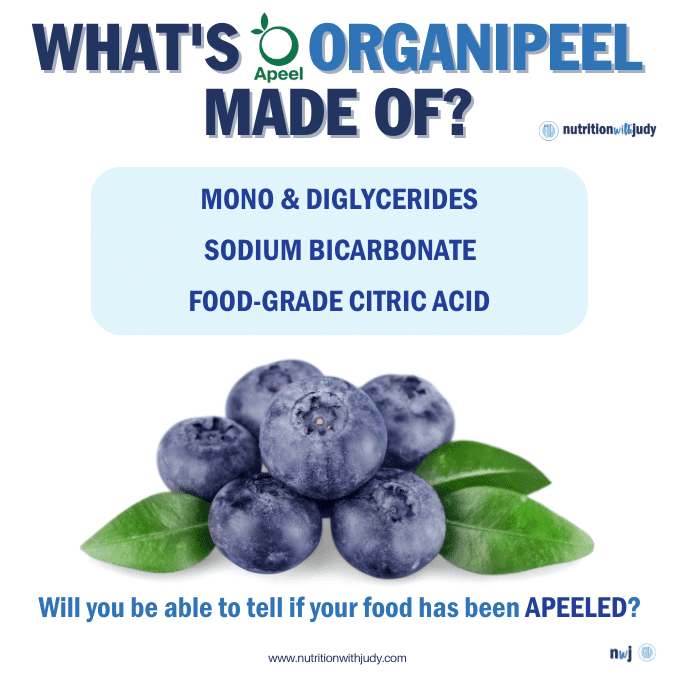

Now that we’ve evaluated all the dangers and risks of consuming Edipeel, let’s take a closer look at the organic produce solution Organipeel. Organipeel is Apeel’s OMRI-listed product for organic produce. In 2023, the company finally disclosed the ingredients of this product. This product utilizes citric acid and sodium bicarbonate (e.g., baking soda) along with the same mono- and diglycerides used in Edipeel. The mono- and diglycerides in this formula are said to distribute the citric acid onto the surface of the produce.
The company has been transparent regarding the sourcing of its citric acid, reporting that it utilizes a synthetic version that’s fermented Aspergillus niger or Candida yeasts.
Why Should We Avoid Apeel’s Organipeel?
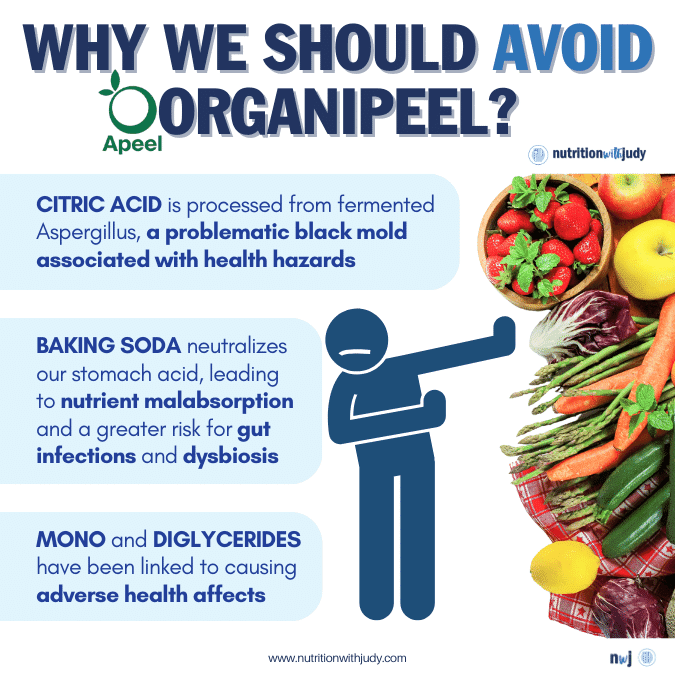

In addition to all the risks and dangers outlined above regarding mono- and diglycerides, citric acid and baking soda can be quite problematic as well.
Citric Acid
Traditionally, citric acid once was sourced from citrus fruits, particularly lemon and lime, as it occurs naturally in this produce. It’s responsible for attributing their sour, tart taste. Up until the early 1900s, researchers discovered that citric acid could also be made from a different source and switched to this cheaper manufacturing method. 99% of citric acid today is manufactured through this synthetic process. The synthetic version is produced by fermenting and feeding sugars to mold, specifically the black mold strain Aspergillus niger. This manufactured version is commonly seen as a food additive and is also in nutritional supplements and cleaning agents. Due to its acidic and sour-tasting nature, it is generally used as a preservative and flavoring agent.
It’s important to note that the manufactured synthetic versions of citric acid differ from what’s naturally derived in citrus fruits. It’s the synthetic versions that pose risks. Here’s why synthetic citric acid can be problematic:
- FDA Classification as Generally Recognized As Safe: As mentioned above, GRAS is a regulatory loophole that Apeel is already taking advantage of for its Edipeel classification. Citric acid is also classified as GRAS. However, the safety of manufactured citric acid has never been studied since it was granted GRAS status.
- Fermented Aspergillus niger: While mainstream mold research can be very flawed, studies are showing the health hazards associated with this mold species. It is also known to cause an infection called Aspergillosis. Individuals suffering from Chronic Inflammatory Response Syndrome (CIRS), also known as mold illness, can be more susceptible to the risks of ingesting fermented Aspergillus niger. While consuming mold isn’t what causes CIRS, it can lead to small intestinal fungal overgrowth (SIFO) in individuals with compromised immune systems and gastrointestinal (GI) systems.
- Potential Health Risks: There are no scientific studies that exist investigating the safety of ingesting large amounts of citric acid long-term. However, one study reported that manufactured citric acid may contribute to the inflammation seen in asthma, juvenile idiopathic arthritis, autistic spectrum disorder, and fibromyalgia. It also found various symptom development in certain individuals after consuming foods with manufactured citric acid – the same symptoms were not observed in people consuming natural forms of citric acid. These symptoms included joint pain with swelling and stiffness, shortness of breath, and muscular and stomach pain.
- GMO Sugars: Citric acid is commonly fermented with glucose syrups from sugar beet molasses and low-quality sugarcane byproducts that are conventionally raised and genetically modified. Since organic produce is inherently supposed to be GMO-free, this is another point of concern.
Baking Soda
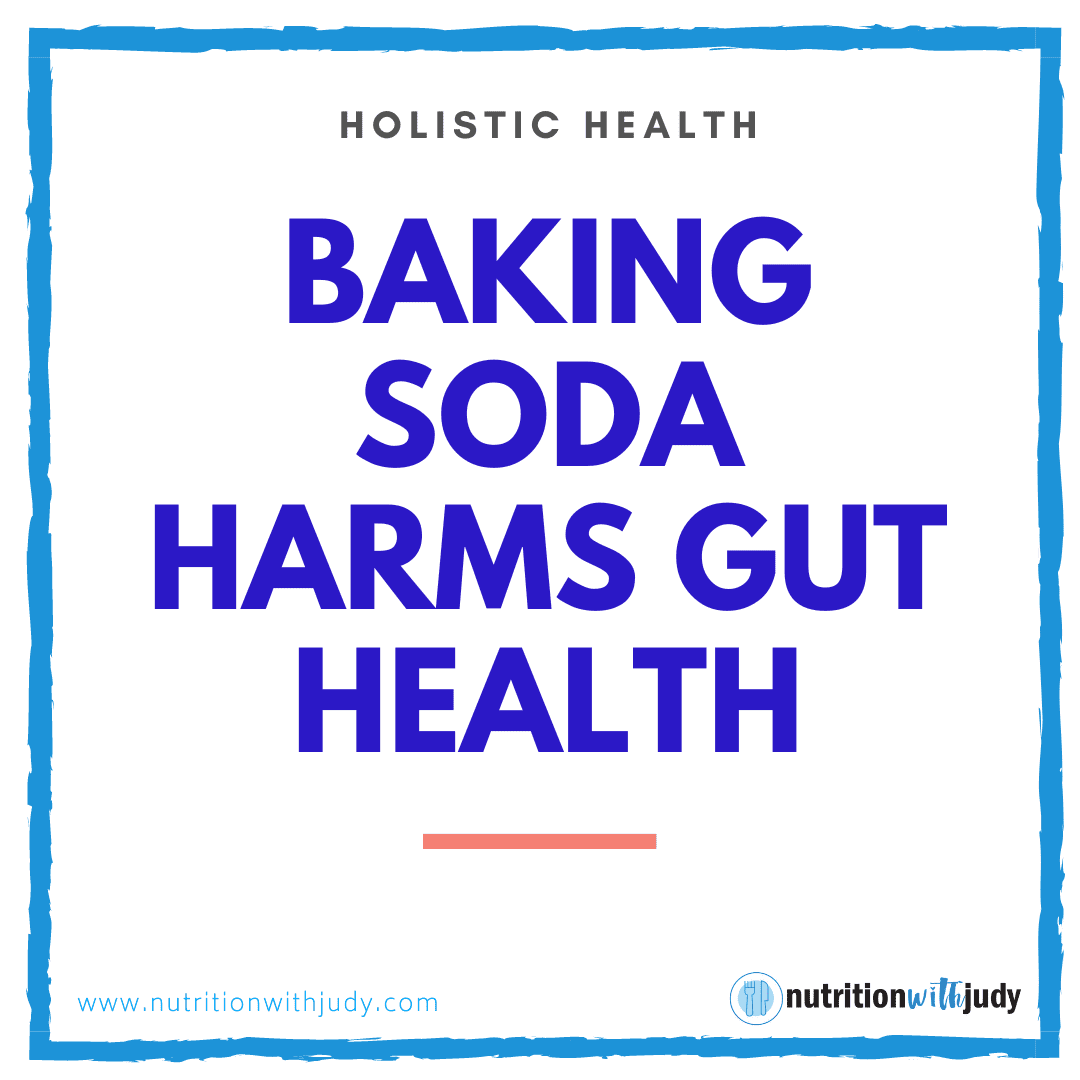

Many of us use baking soda in our electrolyte drinks and foods. Some of us even take it when we experience heartburn or indigestion. Baking soda, or sodium bicarbonate, is a substance that the pancreas releases into the small intestine when we digest food. Its main job is to neutralize the stomach acid that comes into the small intestine with the partially digested food. This is important because it helps protect the inside of the intestine and makes sure that the enzymes, which help break down the food further, can work properly. The digestive process needs to be very acidic in the stomach in order to ensure proper digestion. When we consume baking soda, we break down the hydrochloric acid in our stomach, causing the digestive process to break down.
The stomach must have enough stomach acid and at the right pH for foods to get broken down in order to kill pathogens and readily absorb nutrients in foods via the small intestine. Some enzymes only function in an acidic environment, and certain enzymes react with nutrients to support bodily reactions for nutrient absorption. Once the enzymes lose their shape from pH imbalances, they will not release or react with the bodily chemicals. This, again, breaks down the digestive process.
When we consume baking soda, we are breaking down the digestive process Our stomach acid should be at a pH of 1.5-3; if the pH is raised above 4.0, bacterial overgrowth can occur. Baking soda has a pH of 8.3. When we constantly consume baking soda, or take large amounts of it, we are essentially neutralizing our stomach’s hydrochloric acid. If you damage the pH of your stomach acidity, it will cause nutrient malabsorption, leading to adverse health conditions. Low stomach acid is also a risk factor for developing gut infections and dysbiosis such as SIFO and small intestinal bacterial overgrowth (SIBO).
Other Organipeel Concerns
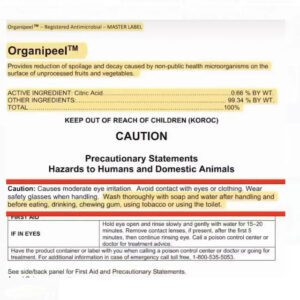

- Safety Concerns: Apeel Organipeel is registered as a pesticide with the EPA. Not only does the registration documentation fail to list the full ingredients of this product, but the EPA is also requiring a caution on the label that states: “Wash thoroughly with soap and water after handling and before eating, drinking, chewing gum, using tobacco, or using the toilet.” Yet this protective coating is supposedly designed to be eaten and is marketed as safe.
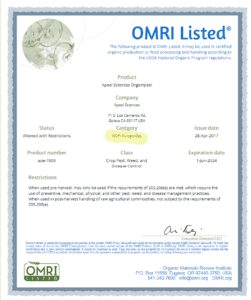

- EPA Classifies as Fungicide: While Apeel markets the inclusion of food-grade citric acid due to its fungicidal properties to prevent spoilage and decay, explaining that’s why it’s classified as a fungicide by the EPA, would you feel comfortable eating produce intentionally coated with a fungicide that’s actually sourced from fermented black mold?
Apeel: Another Concern for Foods From the Plant Kingdom
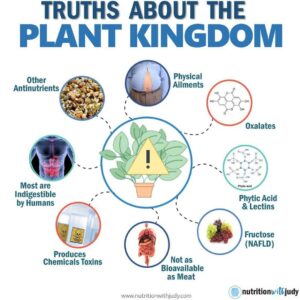

As we know, plant foods can already be problematic for a number of reasons. Here’s a quick summary of the potential issues foods from the plant kingdom contain. You can learn more in-depth about these concerns here.
- Anti-nutrients: Plant anti-nutrients found throughout the plant food kingdom such as lectins, oxalates, and phytic acid, have been linked to serious health implications ranging from autoimmunity to poor mineral absorption.
- Mycotoxins and aflatoxins: These toxic mold particles are highly inflammatory and even carcinogenic, and are found commonly in nuts, grains, seeds, legumes, spices, dried fruit, coffee beans, and processed foods.
- Glyphosate, herbicides, and pesticides: Glyphosate and many common herbicides and pesticides are established as large contributors to cancer and other health issues. Measurable levels have been found across conventional, non-GMO, and even some organic produce.
- Bioavailability: Plant foods aren’t as bioavailable as meat in terms of nutrients, protein, and amino acids. Eating plant-based will also lead to nutritional deficiencies without proper supplementation.
- Fructose and carbohydrates: Excess sugar consumption is a major driver for chronic illness. Both complex and simple carbohydrates are broken down into glucose in the body, and fructose may be even more damaging to health than glucose.
With Apeel as a new addition to this list, it’s even safer to say– let’s just stick to meat.
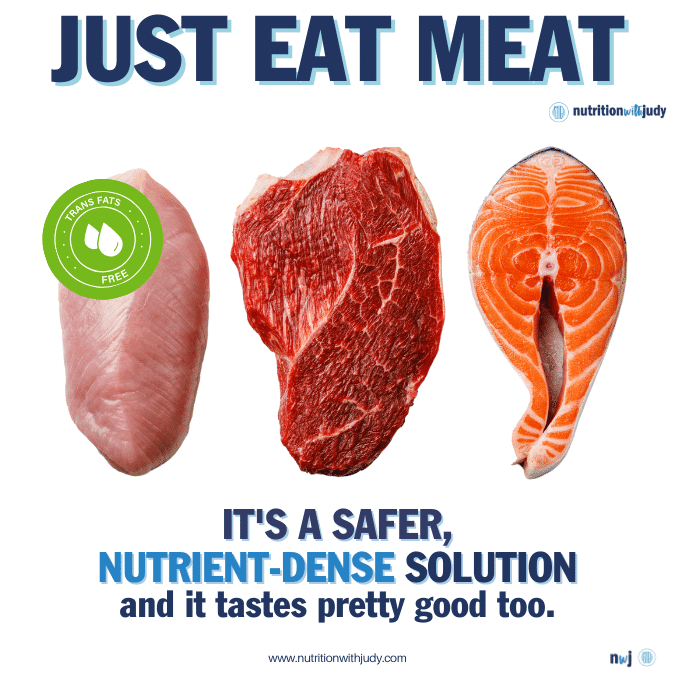

And if you still think eating vegetable oils, plant foods, or plant-based meat alternatives is better for your health and helping save the planet, make sure to check out these articles:
- Beyond Meat: Meat Alternative Solution?
- Meat and Climate Change
- World Health Organization Recommends Canola Oil
Closing Thoughts On Apeel
With no transparency or third-party evaluation of the product safety information, no long-term safety studies, questionable ingredients linked to adverse health effects, and the fact that Apeel can be used with no restriction on all produce for sale to the public, it’s just another reason to be informed on how many fruits and vegetables we’re allowing into our diet. Unless you’re growing your own produce or have a relationship with a local produce farmer, limiting fruits and vegetables and focusing on nutrient-dense animal products is best. Now that even organic produce has been compromised, this is even more reason to make meat and animal fat the center of your diet.
Work With Our Trusted Carnivore Diet Functional Nutritional Therapy Practitioners
The Nutrition with Judy practice is honored to be a trusted carnivore diet practitioner support serving clients from around the globe. We’re passionate about helping our clients achieve root-cause healing in order to lead the best quality of life possible that’s nearly symptom-free. Our team is dedicated to educating our community about the incredible benefits of the carnivore diet. We welcome you to explore our free resources and are always available to support you through personalized protocols. Our Symptom Burden Assessment (SBA) is the perfect starting point for discovering your root cause and is required to work with our team— you can learn more in-depth about this powerful tool here.
Start your root-cause healing journey today and contact us any time with any questions or concerns.
DISCLAIMER: This content is for educational purposes only. While we are board-certified in holistic nutrition and are nutritional therapy practitioners, we are not providing medical advice. Whenever you start a new diet or protocol, always consult with your trusted practitioner first.




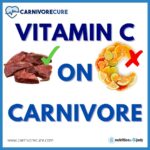

Katharina Zacharias
June 26, 2023 at 9:57 pmHi so what produce doesn’t contain this coating? What about berries ?
Thanks
Suzanne Goodwin
June 29, 2023 at 7:12 amWe need to address whether the donors are pushing mono- or di- glyceride is just another way to get their injectables into every human. B Gates sold his vax stock and reinvested in agriculture. Why? Because he felt that the “C19 injections failed miserably getting into the arms of every human being.” Gates is also a huge WEF, WHO, and Big Pharma/Agri contributor. I think our concerns are not addressing the smoking gun behind the same lipid nanoparticles allowed in the C 19 shots are hiding inside this spray. Has anyone done a Mass Spec on Apeel?
Mia Black
March 24, 2024 at 2:15 pmYou hit the major points. I would think someone has to have looked at this compound via a mass spectrometer, but possibly only it’s creators. I am beyond disappointed in the federal government for what is allowed in our food production. It isn’t surprising though, at this point.
Cathy Noyce
July 1, 2023 at 8:52 amWhat is the saying, “Those who ignore history are doomed to repeat it” or something like that. I think it is more like, those who ignore evil are doomed to be controlled by it. Remember Alar from the 80s. So similar. Thank you for bringing this to our attention! You are greatly appreciated. Gladly remaining carnivore.
Monica martella
October 30, 2023 at 1:13 pmThank you for the warning about Apeel. You are very mistaken in some of your statements about eating plants, and you should correct those asap. Humans who eat flesh and secretions from animals get anemic and B12 deficicient, as do some humans who eat only plants and fungi. Bioavailability can be disrupted by several different factors, including drugs like caffeine. Autoimmune diseases caused by plants? Hell of a statement; what’s your source? Do you have an interest in animal ag? Speaking of disease, our bodies make 100% of the cholesterol we need to be healthy. There’s no “good” incoming cholesterol. Cholesterol’s relocation into arterial walls is a sign that animal “products” are toxic to humans, and a rik factor for strokes and heart disease, and in some cases, cancer. Please edit out your propaganda on behalf of violent industries. Thank you again for the information about Apeel and the perpetrators behind it.
Angela
December 6, 2023 at 11:27 amI agree. Appreciate this post on Apeel but as someone who’s been plant-based for 9 years, I am thriving, stronger than ever and DON’T use supplementation and am the furthest thing from a nutritionally deficient lol
Sounds like someone is funded by animal agriculture for sure, I’m shocked it’s coming from a nutritionist. Everybody’s bio-chemistry is different, some thrive of omni diets, others completely plant-based but our bodies NEED fibre and it’s the phytonutrients in the colours of plants which make them so magical and medicinal. By making those wide over-generalizing statements is dangerous. What about the cumulative damage in meats, the acidity, the fear and cortisol you are consuming? Not to mention the cholesterol. Rather than attacking plants and vegetables with general statements, perhaps educate people on how to make them more bio-available. Nuts can be activated to make them more bio-available by soaking them, removing any unwanted anti-nutrients and dehydrating them. Cooking greens like spinach and broccoli increases absorption rates… so much left unsaid. I am disappointed, I loved this post then you completely lost me as a follower for your complete ignorance around plants aka nature’s medicine.
Judy Cho (NwJ)
December 9, 2023 at 6:53 pmWe get ZERO funding from any animal agriculture or any big food, or meat company. We make our resources from our private practice serving our clients and patients, and then we share our clinical outcomes and by doing our own research/clinical research. I know you want to believe there’s some conspiracy theory behind my article, but sorry, we’re just trying to help people. And the truth is that plants do have toxins. Figuring out what level is safe for you is everyone’s own n=1.
https://www.nutritionwithjudy.com/the-darkside-of-plants-anti-nutrients.
Lastly, I do believe in plants as medicine (some of the extracts). But just as they have the potency to heal when we extract certain compounds for healing, the same logic should be applied to understand that plant foods, especially when doused in glyphosate and herbicides/pesticides, also have the risk to hurt. You can’t use logic when it only benefits you. Plants being medicine can also be a poison. Figuring out which plant is a medicine or poison is for each individual to learn, and we applaud bioindividuality.
The body also does not need fibre, not sure where you learned that. https://www.nutritionwithjudy.com/seven-fiber-myths
Trust me. We do the research and back up what we share.
Fran
October 31, 2023 at 12:20 pmAll the post was excellent UNTIL you reached almost the end by saying that “fructos is bad foryour health” so we should stick to meat. SO RIDICULOUS!! thank you for the informaton of Apeel, and no thank you for your nutritional guidance.
Palles Skeels
November 21, 2023 at 12:06 pmTruly. They are absolutely ignoring the FACT, that each and every, homonid body, has the entrails of an herbivore. Period.
Jack
January 14, 2024 at 11:08 amTotally Agree! 👍 Good advice on the toxic Apeel. Bad nutrition advice at the end
Vivi Austn
November 3, 2023 at 2:34 pmSo, I guess the only option is to go to your local farm for produce that you can trust.
Nutrition with Judy
December 9, 2023 at 6:57 pmYes, I agree with this the most.
Joyce nowell
November 7, 2023 at 11:38 pmPeople with CKD, and other diseases can’t eat read meat and lot of protein. What about diabetics and CHF. Your answer for this. Thank you.
JOACHIM MAZURA
December 8, 2023 at 8:49 pmSo my famous Bragg Apple Cider Vinegar is most likely no longer “Organic”….ouch! What a shame.
Janis Spencer
December 11, 2023 at 11:17 amPlease contact the growers and let them know you will not buy their product with Apeel on it. And stores. But more importantly, write your representatives.
Leon Tarr Jr
December 18, 2023 at 7:46 pmThank you Judy for the heads up. We take meds to get rid of triglycerides, and they spray our food with chemicals that produce it in the blood stream. This is coming from people who want world population down drastically. They should be locked up for crimes against humanity. JCITWTL, follow Him.
Mëlicious
December 26, 2023 at 11:24 pmSpot on, facts and truth, sister!
Ignore the plant eaters; they are just mad that our food eats theirs! 😆
Jack
January 14, 2024 at 11:09 amThat’s a pretty ignorant statement
Monica
March 13, 2024 at 6:13 amThank you for taking a well researched stand!
D Johnson
December 27, 2023 at 2:55 pmThank you for an insightful feature article. This issue needs to be cast abroad so people can at least be aware of Apeel’s existence so they can choose to eat it, ferret-out untreated foods, eat meat or not eat meat, etc. The bigger issue is, we are being forced to grab-and-go from the grocery stores (organic or not) to our bellies without knowledge or fanfare about the product. This article goes a loooong way in informing the public of the potential harms.
Joshua Haatanda
January 9, 2024 at 2:01 amThank you very much am based in Africa Zambia in particular at least here we can grow a few veggies and fruits from our backyard gardens better still we have a good share of wild organic fruits we harvest every year like baobab which we are willing to share with our friends in the western world if they are willing.thanks once more for this data and from now rhence I will be reading and sharing your data
SG
February 11, 2024 at 10:48 amHow can I know if the organic fruit and vegetables are apeel?, do they have a sticker on them or some kind of identification label?